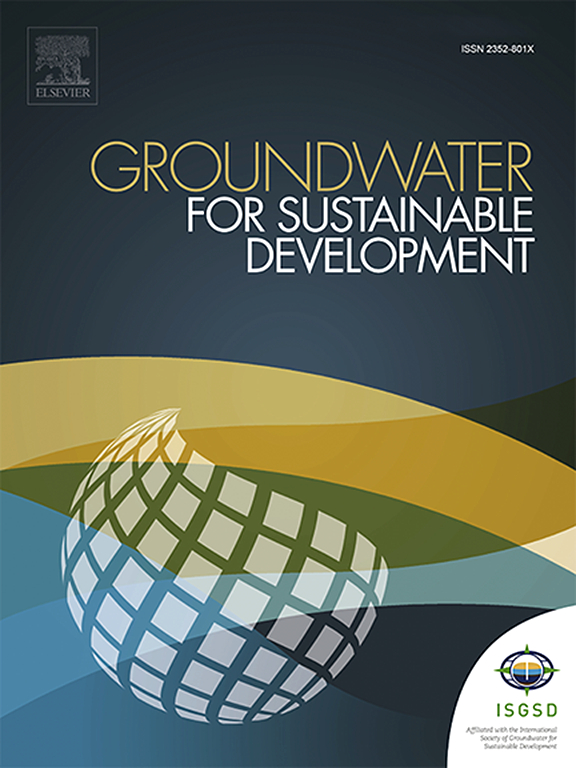没有参与的创新?摩洛哥农民对Haouz Mejjat含水层合同的看法
IF 4.9
Q2 ENGINEERING, ENVIRONMENTAL
引用次数: 0
摘要
不可持续的地下水开采做法导致地下水位急剧恶化,特别是在干旱和半干旱地区。在摩洛哥,政府实施了一些预防措施,包括参与式地下水管理合同(PGMCs)。本研究旨在增进我们对参与式地下水管理背景下农民决策的理解。为此目的,对Haouz-Mejjate含水层的某些农民进行了半结构化访谈。本研究采用定性方法来揭示农民面临的共同挑战,特别是水资源短缺和气候变化。这项研究的新颖之处在于评估了北非pgmc的有效性。最重要的是,我们对影响农民观点和行为的因素提供了新的见解。另一个新颖之处在于将经济合作与发展组织(OECD)框架应用于农民视角分析,使人们能够更好地了解农民与pgmc合作的障碍。调查结果强调了应对这些共同挑战的重要性,包括执法不力、数据和信息不足以及利益攸关方参与有限。此外,我们的研究结果表明,农民在pgmc设计和实施中的有限参与反映了一种自上而下的治理模式,这种模式既破坏了对机构的信任,也破坏了pgmc的有效性。最后,我们的研究结果强调,有必要采取有针对性的干预措施,让农民清楚地了解情况,让他们发出自己的声音,并考虑他们的各种观点,这是制定有效和令人满意的解决方案并改善参与式地下水治理的第一步。本文章由计算机程序翻译,如有差异,请以英文原文为准。

Innovation without participation? Moroccan farmers' perspectives on Haouz Mejjat aquifer contract
Unsustainable groundwater extraction practices have led to a sharp deterioration of the water table, especially in arid and semi-arid regions. In Morocco, the government has implemented certain preventive measures, including Participatory Groundwater Management Contracts (PGMCs). This study aims to enhance our understanding of farmers’ decision-making in the context of participatory groundwater management. To this end, semi-structured interviews were conducted with certain farmers in the Haouz-Mejjate aquifer. This study adopts a qualitative approach to shed light on the common challenges faced by farmers, notably water scarcity and climate change. The novelty of this study lies in assessing the effectiveness of PGMCs in North Africa. Most important, we provide new insights regarding the factors that seem to influence farmers' perspectives and behaviors. Another novelty lies in applying the Organization for Economic Cooperation and Development (OECD) framework to the analysis of perspective of farmers, enabling an improved understanding of the barriers to farmers collaboration with PGMCs.
The results highlight the importance of tackling these common challenges, including weak enforcement, insufficient data and information, and limited stakeholder engagement. Moreover, our findings suggest that the limited involvement of farmers in the design and implementation of PGMCs reflects a top-down governance model that undermines both trust in institutions and the effectiveness of PGMCs. Finally, our results underscore the need for targeted interventions to inform farmers clearly, give voice to them, and take into account their various perspectives as a first step to developing effective and agreeable solutions and to improving participatory groundwater governance.
求助全文
通过发布文献求助,成功后即可免费获取论文全文。
去求助
来源期刊

Groundwater for Sustainable Development
Social Sciences-Geography, Planning and Development
CiteScore
11.50
自引率
10.20%
发文量
152
期刊介绍:
Groundwater for Sustainable Development is directed to different stakeholders and professionals, including government and non-governmental organizations, international funding agencies, universities, public water institutions, public health and other public/private sector professionals, and other relevant institutions. It is aimed at professionals, academics and students in the fields of disciplines such as: groundwater and its connection to surface hydrology and environment, soil sciences, engineering, ecology, microbiology, atmospheric sciences, analytical chemistry, hydro-engineering, water technology, environmental ethics, economics, public health, policy, as well as social sciences, legal disciplines, or any other area connected with water issues. The objectives of this journal are to facilitate: • The improvement of effective and sustainable management of water resources across the globe. • The improvement of human access to groundwater resources in adequate quantity and good quality. • The meeting of the increasing demand for drinking and irrigation water needed for food security to contribute to a social and economically sound human development. • The creation of a global inter- and multidisciplinary platform and forum to improve our understanding of groundwater resources and to advocate their effective and sustainable management and protection against contamination. • Interdisciplinary information exchange and to stimulate scientific research in the fields of groundwater related sciences and social and health sciences required to achieve the United Nations Millennium Development Goals for sustainable development.
 求助内容:
求助内容: 应助结果提醒方式:
应助结果提醒方式:


